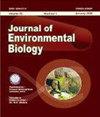Seasonal variation of Ichthyofaunal diversity and it’s relation with substratum in the River Changa, West Bengal, India
IF 0.7
Q4 ENVIRONMENTAL SCIENCES
引用次数: 0
Abstract
Aim: A survey was conducted at four sampling sites of the River Changa to study the fish diversity in relation to river substratum. The aim of the study was to prepare a check list of ichthyofaunal diversity and their habitat preference guild in relation to sediment type. Methodology: Ichthyofauna was collected from four selected stations at monthly interval with the help of fishermen using gill net and cast net. For the analysis of the riverine substratum, sediment samples were collected from six square inches area at the sampling sites of the river by grab sampling method. The composition of stones, pebbles, sand and mud were evaluated from the sample. Results: A total of 64 fish species belonging to 6 families and 18 orders were recorded. Among which 33 were cold water fishes, 31 were warm water fishes, 28 were rheophilic and 24 were eurytopic fishes. Site 1 and 2 were dominated by rheophilic and cold water fishes and Site 4 was rich in eurytopic and warm water fishes. Cypriniformes was the most dominant order with 42 fish species. River sediment of Site 1, 2 and 3 were dominated by stones, pebbles and sand, while sediments collected from Site 4 was dominated by sand and mud. Cold water and rheophilic fishes were positively influenced by stones and pebbles. Eurytopic and warm water fishes were positively influenced by sand and mud. Interpretation: Cold water and rheophilic fishes were abundant at upstream of the river and eurytopic and warm water fishes were abundant at downstream of the river. Abundance and distribution of fish species depends on the river substratum. Key words: Ichthyofaunal diversity, Rheophilic, River Changa, River substratum印度西孟加拉邦昌加河鱼类多样性的季节变化及其与底层的关系
目的:在昌加河的四个采样点进行调查,研究鱼类多样性与河流底层的关系。本研究的目的是编制一份鱼类区系多样性及其与沉积物类型相关的栖息地偏好协会的检查清单。方法:在渔民的帮助下,使用刺网和流网,每月从四个选定的站点收集鱼类。为了分析河流底层,采用抓斗取样法从河流取样点的6平方英寸区域采集沉积物样本。从样品中评估了石头、卵石、沙子和泥浆的成分。结果:共记录鱼类64种,隶属于18目6科。其中冷水鱼类33种,温水鱼类31种,亲流鱼类28种,广食性鱼类24种。地点1和2以亲流性鱼类和冷水鱼类为主,地点4富含嗜光性鱼类和温水鱼类。其中以鲤鱼形目最多,共有42种鱼类。场地1、2和3的河流沉积物以石头、卵石和沙子为主,而从场地4收集的沉积物以沙子和泥浆为主。冷水和亲流鱼类受到石头和卵石的积极影响。嗜酸性和温水鱼类受到沙泥的积极影响。解释:河流上游有丰富的冷水性和亲流性鱼类,河流下游有丰富的嗜光性和温水性鱼类。鱼类的丰富程度和分布取决于河流底层。关键词:鱼类群落多样性,亲Rheophilic,昌加河,河流底层
本文章由计算机程序翻译,如有差异,请以英文原文为准。
求助全文
约1分钟内获得全文
求助全文
来源期刊

Journal of environmental biology
ENVIRONMENTAL SCIENCES-
CiteScore
1.70
自引率
0.00%
发文量
92
审稿时长
3 months
期刊介绍:
Information not localized
 求助内容:
求助内容: 应助结果提醒方式:
应助结果提醒方式:


